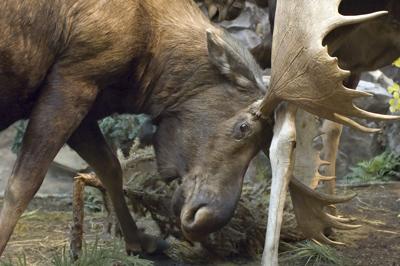If you've ever seen a bull moose in person, you were probably able to identify it by a massive set of paddle-like antlers, but did you know that moose shed and grown new antlers each year?
A recent Ring Doorbell video, posted to Facebook by Alaska resident Tyra Bogert, shows the moment a moose shook off both of its antlers right in front of her home.
Moose are the largest animals in Colorado, coming in between 6 and 7 feet tall at the shoulder and weighing up to 1200 pounds. Not surprisingly, they are also the animal with the biggest antlers in the state. According to the Colorado Wildlife Council, a moose's antlers can be up to six feet wide, end to end, and weigh up to 40 pounds.
Like most antlered animals, moose shed their antlers every year. This typically happens after the rutting season, when bulls no longer need to compete for mates. A report by National Geographic credits the decrease in testosterone after breeding season as the cause for shedding. The hormone decrease reportedly results in a demineralization at the antler's base, the report reads.
According to the U.S. Fish and Wildlife Service, antlers are the fastest growing bone on the world, and a healthy moose can grow as much as a pound of antler per day. At that speed, moose antlers can reach full size within several weeks.
Shed antlers can also be valuable treasures for other animals, as they contain nutrients like calcium phosphorus and protein.
"These nutrients are important for all types of animal growth, not just big strong antlers. Rodents in particular love shed antlers - mice, squirrels and porcupines will gnaw on antlers for their nutrients and to wear down their ever-growing teeth. Even bears, foxes, opossums and otters have been known to eat antlers," USFW said.
Finding shed antlers is not necessarily uncommon in Colorado, but there are varying rules across the state on whether or not they can be collected. More information on the laws around keeping antlers, can be found here.
STAY INFORMED: Sign-up for the daily OutThere Colorado newsletter here








(0) comments
Welcome to the discussion.
Log In
Keep it Clean. Please avoid obscene, vulgar, lewd, racist or sexually-oriented language.
PLEASE TURN OFF YOUR CAPS LOCK.
Don't Threaten. Threats of harming another person will not be tolerated.
Be Truthful. Don't knowingly lie about anyone or anything.
Be Nice. No racism, sexism or any sort of -ism that is degrading to another person.
Be Proactive. Use the 'Report' link on each comment to let us know of abusive posts.
Share with Us. We'd love to hear eyewitness accounts, the history behind an article.